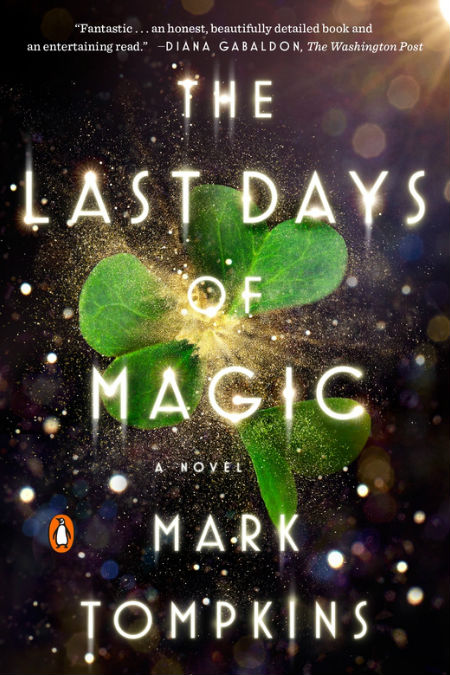
There is an immersive sense of otherworldliness that must be present in any fantasy tale worth it’s magical salt, if we are to truly buy into its escapist narrative.
A sense that you are in a world completely and utterly not your own, and yet, and here lies the tricky balancing act, still very human and relatable.
Mark Tompkins manages to propel us far from the drab confines of the everyday with ease in The Last Days of Magic, which tells the story of the near-death of magic in Ireland in the 14th century at the hands of the combined forces of the English crown and the avaricious twisted forces of the Vatican instead on seeing itself as the One True Church.
Ireland at this time, or at least in Tompkins retelling of it (there’s a great deal of historical elasticity at play here to pleasing effect), is a place overflowing with Ardor, as magical energy is rather magically known, populated by mystical Celts, witches, liberal Christians in the form of the Irish Free Church, a democratic monarchy that elects its kings and queens, and a host of Nephilim such as faeries (Sidhe), mermaids (Fomorians), the product of “unholy” unions between humanity and angels or demons.
“As the black mass passed overhead, Liam knew he had been called, an enchanted call that told him he would soon be needed elsewhere. It may have come in the cry of the birds, or in the wind they rode upon, or in the leaves that rustled in their wake. Or perhaps from something else entirely. It was a moment of knowing for those like Liam who could still perceive. Even in Ireland many were forgetting how to–forgetting itself a force as powerful as any spell–but not those who carried the blood of the Sidhe.” (P. 29)
In contrast to the rest of Europe, which has long had since the Ardor squeezed out of it – although a powerful witches coven in the French Court and the Vatican’s heretic-hunting VRS League seem happy to use it for their own nefarious ends – Ireland is running amuck with it, with battles fought and won based on the magical power that each power can access and manifest.
The greatest power of them all is the Goddess Morrígna who, much like the Christian God who shares Irish belief systems with her,is a three part entity, one anchored in the Annan or Otherworld, the other two taking the form of red-headed female twins called Anya and Aisling, one a learned scholar, the other a warrior, but both, especially after they unite at age 14, as the protector of Ireland and her magical independence.
Together all these mystical beings and the people who treat them with due reverence make up a sprawling tapestry of life and belief in the Emerald Isle, a rich, powerful and varied panoply of belief that Tompkins brings to life with vivacious intensity, in the process reminding us how much we have lost in our rush to the perceived safety of monotheism, modernity and materialism.

One thing that strikes you almost immediately as you tear into The Last Days of Magic – it makes for compulsive reading; perhaps the result of a spell, or more likely, Tompkins beautifully balanced writing which moves between momentous narrative, historical truth and emotional resonance with exquisite ease – is the way the book flows so easily between the epic grandeur of power and the endless battles for it, and intimate moments between characters.
Far more than epics like Game of Thrones, where most everyone is hellbent on the others’ destruction, The Last Days of Magic gives us all too-human characters and otherworldly beings who laugh, take joy in quiet moments and who fight, not for power necessarily, than the right to remain able to determine their own destinies.
It is this innate humanity, which suffuses every page of this marvellously engaging, endlessly escapist book – even when hideously naked realpolitik is at play, you feel somehow removed from our world, perhaps because magic is accorded a reality and truth rarely present in our blandly materialistic modern world – which gives this brilliantly-detailed book such a burning, engrossing readability.
“The blackness drew back across the mouth of the cave, boiled there. Semjâzâ spat out curses understood only by those present in the first days of the world, words that formed into black serpents, only to dissolve into fireflies as they crawled towards Aisling. In the same language, Aisling began to repeat Gabriel’s order to Uriel. Her index finger left a luminescent trail as she draw a complex symbol in the air.” (P. 166)
This is magic and fantasy sprung vividly to life, mixed with the the best and the worst of humanity, a tale that spins together the factual and the imagined, the mystical and the material to devastating narrative effect, that is also deeply real and human and immensely fascinating and alive.
That is Tompkins great gift with The Last Days of Magic.
He explores how intricate and richly-layered our world once was, presenting us with a tale of life lost, Ardor squandered and big, bold, expansive thinking and belief systems sacrificed to the small minds and hearts of people who like to play it safe above all things.
This sense of a great many things lost finds expression in the lives of a compelling cast of characters, many of whom act with noble intent, with some still at work even now, as the bookending chapters at the start and finish of this most enlivening of reads makes clear.
In fact, the more modern sections of the narrative, which are lamentably all too brief but impressively effective for their brevity, are salutary call to consider whether myth and magic, evoked in all their wonder, cruelty and variety by Tompkins’ superlative tale, are not so much lost to the world as just out of sight, simply awaiting enquiring minds to come along and find them anew.
Who knows what might happen then? One thing that is certain is that if magic finds its way overwhelming back into the world, and we can’t be present to see it all happen, you will want Tompkins capturing and chronicling it all, weaving together the fantastical and the tangible to beguiling effect.
Andrew,
Thanks for the review! I am so glad you enjoyed the read.
Mark
I did – thank you so much for such a rip-roaringly good read with real intelligence and emotional resonance.